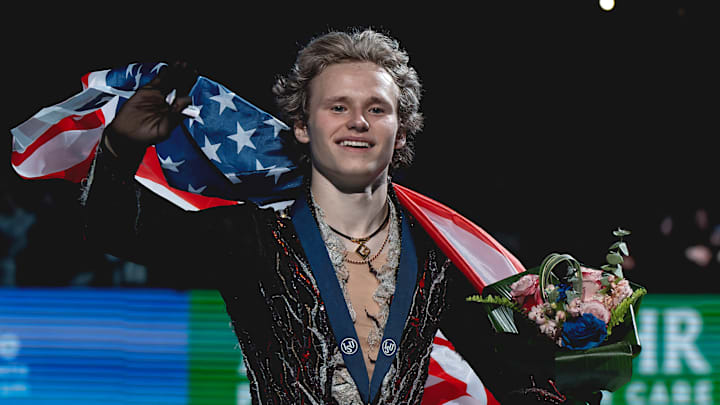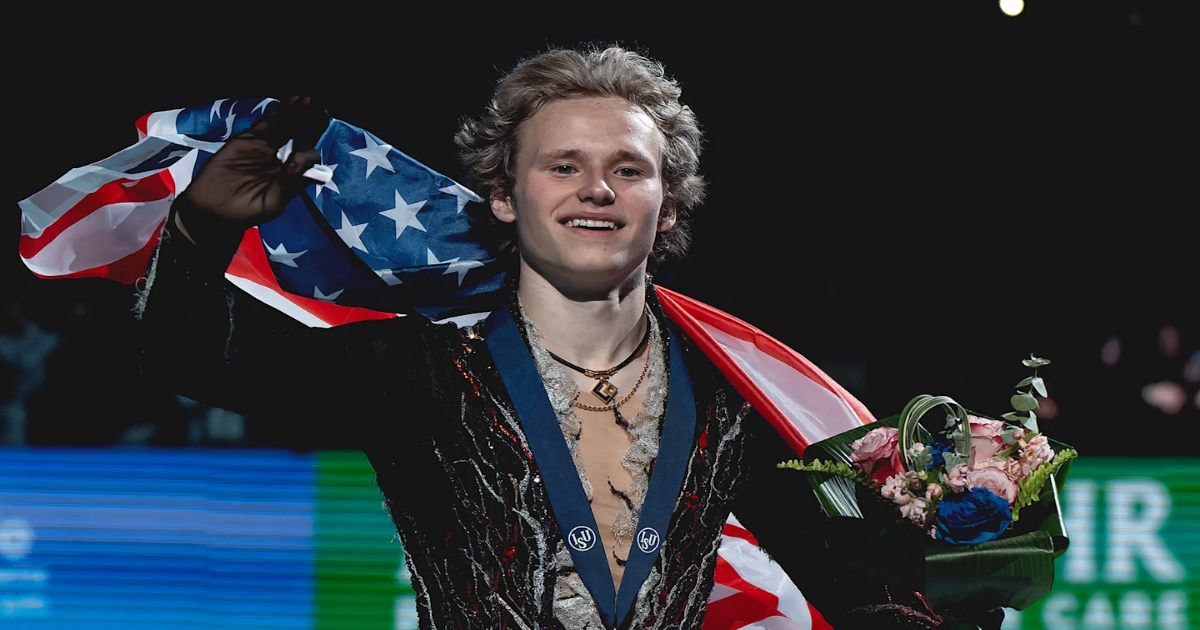
It looks like Malinin will be the man to beat at next year’s Olympics. / Erick W. Rasco/ Sports Illustrated
Ilia Malinin had just won his second consecutive figure skating world championships gold medal, and he could barely contain his disappointment.
A year ago, when he collapsed to the ice after a free skate that sealed the title, he felt joy. On Saturday, that same gesture signified frustration.
Sure, his 318.56 total score—31.09 points ahead of second place in a sport often decided by tenths—was the best this season. He won his ninth straight event. He landed six quadruple jumps, tied for the most of all time in a single program.
But afterward, all Malinin, 20, could think about was the one that had eluded him. After landing four quads in the first 90 seconds of his free skate—a flip, an axel, a lutz and a loop—he got “too excited,” he said. He did not manage his planned quad lutz, doubling it instead. It was his only major mistake of the night. It will be the only moment he replays in his mind.
“That seven-quad layout for me, it’s really my ideal layout,” he said wistfully. “I really want to nail this and have it be comfortable, effortless. I really want it so I can have another history marking.” He added, “It wasn’t the skate I would’ve liked.”
Malinen’s winning deficit was larger than the gap between second and ninth place. / Erick W. Rasco/Sports Illustrated
The sellout crowd at Boston’s TD Garden seemed O.K. with it. After his leaderboard-topping short program on Thursday, Malinin was set to skate last on Saturday, and it seemed as if the event crescendoed around him. First, Alysa Liu, on Friday night, in an astonishing comeback after two and a half years off the ice, took gold in the women’s event. Then Madison Chock and Evan Bates won their third straight world title in ice dance on Saturday afternoon.
Then Malinin appeared, the U.S.’s third gold—the first time it has won three of four events at a world championship—all but locked up before he even took the ice. The roars when he was introduced were surpassed only by the ones that rocked the building when he won. Fans tossed perhaps 100 stuffed animals onto the ice in recognition, and the standing ovation he received seemed to last nearly as long as his free skate.
His margin over second place on Saturday was greater than the gap from second to ninth, the second-largest interval since this scoring system was introduced 21 years ago. He could have fallen a few times and still won. Indeed, when Yuma Kagiyama, of Japan, skating second to last, finished a disappointing program and learned his score put him in second place, he gleefully held up three fingers. (Mikhail Shaidorov of Kazakhstan took silver.)
After the short program, Kagiyama gushed about Malinin’s ability. “He makes it look effortless,” Kagiyama said through an interpreter. “Maybe he is putting effort, but to us, it looks effortless and really easy. And it’s not just his jumps. I feel like his skating and his artistry, his expression, is getting better year by year. I’m starting to think he’s invincible.”
Malinin grinned. He did not disagree. Two nights later, he batted away questions about being the favorite for next year’s Milan Olympics. His talent is such that just winning is no longer interesting for him. (He has not lost an event since 2023.) In ’22, he narrowly missed the Olympic team; he responded by hitting the first fully rotated quadruple axel ever in international competition. In ’23 he became the first skater to land all six jumps—axel, flip, lutz, loop, salchow and toe loop—as quads. In ’24 he took the world title with a world-record 227.79-point free skate (333.76 total), then became the first skater to land all six jumps as quads in one program. Now he has set his sights on that seven-quad program.
At the Grand Prix Final in December, he fell on one of his two quad lutzes. At the U.S. championships in January, he fell on his quad loop. (It was landing the loop on Saturday that caused him to lose focus and botch that lutz.)
Once Kagiyama faltered on Saturday, Malinin could have simplified his routine and just skated, if you will, to gold. He seemed confused by the question of whether he had considered making such a change. “My main goal was to try to go for this perfect layout,” he said. He added, “Until I land all of them, I think I wouldn’t want to cut back.”
He did not sound as if he planned to celebrate this title much. He would give himself three days off, he said. And then he had to get back to work.
Published 7 Minutes Ago|Modified 2:07 AM EDT
